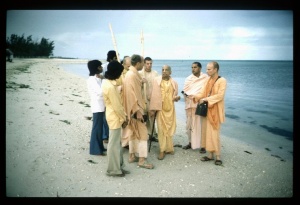SB 10.58.16: Difference between revisions
m (1 revision(s)) |
No edit summary |
||
| Line 1: | Line 1: | ||
{{info | {{info | ||
|speaker= | |speaker=Śukadeva Gosvāmī | ||
|listener=King | |listener=King Parīkṣit | ||
}} | }} | ||
[[Category:Srimad-Bhagavatam - Canto 10 Chapter 58]] | |||
[[Category:Bhagavatam Verses Spoken by Sukadeva Gosvami - Vanisource|105816]] | |||
<div style="float:left">'''[[Srimad-Bhagavatam]] - [[SB 10|Tenth Canto]] - [[SB 10.58: Krsna Marries Five Princesses|Chapter 58: Kṛṣṇa Marries Five Princesses]]'''</div> | |||
<div style="float:right">[[File:Go-previous.png|link=SB 10.58.15]] '''[[SB 10.58.15]] - [[SB 10.58.17]]''' [[File:Go-next.png|link=SB 10.58.17]]</div> | |||
{{RandomImage}} | |||
{{SBnotice}} | |||
==== TEXT 16 ==== | ==== TEXT 16 ==== | ||
<div | <div class="verse"> | ||
tān ninyuḥ kiṅkarā rājñe | :tān ninyuḥ kiṅkarā rājñe | ||
medhyān parvaṇy upāgate | :medhyān parvaṇy upāgate | ||
tṛṭ-parītaḥ pariśrānto | :tṛṭ-parītaḥ pariśrānto | ||
bibhatsur yamunām agāt | :bibhatsur yamunām agāt | ||
</div> | </div> | ||
| Line 17: | Line 22: | ||
==== SYNONYMS ==== | ==== SYNONYMS ==== | ||
<div | <div class="synonyms"> | ||
''tān''—them; ''ninyuḥ''—carried; ''kiṅkarāḥ''—servants; ''rājñe''—to the King; ''medhyān''—fit to be offered in sacrifice; ''parvaṇi''—a special occasion; ''upāgate''—approaching; ''tṛṭ''—by thirst; ''parītaḥ''—overcome; ''pariśrāntaḥ''—fatigued; ''bibhatsuḥ''—Arjuna; ''yamunām''—to the Yamunā River; ''agāt''—went. | |||
</div> | </div> | ||
{{SBcollapse}} | |||
==== TRANSLATION ==== | ==== TRANSLATION ==== | ||
<div | <div class="translation"> | ||
A crew of servants carried to King Yudhiṣṭhira the slain animals fit to be offered in sacrifice on some special occasion. Then, feeling thirsty and tired, Arjuna went to the bank of the Yamunā. | A crew of servants carried to King Yudhiṣṭhira the slain animals fit to be offered in sacrifice on some special occasion. Then, feeling thirsty and tired, Arjuna went to the bank of the Yamunā. | ||
</div> | </div> | ||
| Line 31: | Line 36: | ||
==== PURPORT ==== | ==== PURPORT ==== | ||
<div | <div class="purport"> | ||
As Śrīla Prabhupāda often explained, the kṣatriyas, or warriors, would hunt in the forest for several purposes: to practice their fighting skills, to control the population of ferocious beasts, who were a threat to human beings, and to provide animals for Vedic sacrifices. The killed animals would be given new bodies by the power of the sacrifices. Since priests no longer have that power, the sacrifices would now constitute mere killing and are thus forbidden. | As Śrīla Prabhupāda often explained, the ''kṣatriyas'', or warriors, would hunt in the forest for several purposes: to practice their fighting skills, to control the population of ferocious beasts, who were a threat to human beings, and to provide animals for Vedic sacrifices. The killed animals would be given new bodies by the power of the sacrifices. Since priests no longer have that power, the sacrifices would now constitute mere killing and are thus forbidden. | ||
In the Fourth Canto of the Śrīmad-Bhāgavatam we find that the great sage Nārada severely chastised King Prācīnabarhiṣat for abusing this principle of authorized hunting. In fact, the King had become like modern sportsmen, who cruelly kill animals as a so-called hobby. | In the Fourth Canto of the [[Srimad-Bhagavatam|''Śrīmad-Bhāgavatam'']] we find that the great sage Nārada severely chastised King Prācīnabarhiṣat for abusing this principle of authorized hunting. In fact, the King had become like modern sportsmen, who cruelly kill animals as a so-called hobby. | ||
</div> | </div> | ||
__NOTOC__ | </div> | ||
</div> | |||
<div style="float:right">[[File:Go-previous.png|link=SB 10.58.15]] '''[[SB 10.58.15]] - [[SB 10.58.17]]''' [[File:Go-next.png|link=SB 10.58.17]]</div> | |||
__NOTOC__ | |||
__NOEDITSECTION__ | |||
Revision as of 12:59, 24 May 2021

A.C. Bhaktivedanta Swami Prabhupada
Please note: The synonyms, translation and purport of this verse were composed by disciples of Śrīla Prabhupāda
TEXT 16
- tān ninyuḥ kiṅkarā rājñe
- medhyān parvaṇy upāgate
- tṛṭ-parītaḥ pariśrānto
- bibhatsur yamunām agāt
SYNONYMS
tān—them; ninyuḥ—carried; kiṅkarāḥ—servants; rājñe—to the King; medhyān—fit to be offered in sacrifice; parvaṇi—a special occasion; upāgate—approaching; tṛṭ—by thirst; parītaḥ—overcome; pariśrāntaḥ—fatigued; bibhatsuḥ—Arjuna; yamunām—to the Yamunā River; agāt—went.
Translation and purport composed by disciples of Śrīla Prabhupāda
TRANSLATION
A crew of servants carried to King Yudhiṣṭhira the slain animals fit to be offered in sacrifice on some special occasion. Then, feeling thirsty and tired, Arjuna went to the bank of the Yamunā.
PURPORT
As Śrīla Prabhupāda often explained, the kṣatriyas, or warriors, would hunt in the forest for several purposes: to practice their fighting skills, to control the population of ferocious beasts, who were a threat to human beings, and to provide animals for Vedic sacrifices. The killed animals would be given new bodies by the power of the sacrifices. Since priests no longer have that power, the sacrifices would now constitute mere killing and are thus forbidden.
In the Fourth Canto of the Śrīmad-Bhāgavatam we find that the great sage Nārada severely chastised King Prācīnabarhiṣat for abusing this principle of authorized hunting. In fact, the King had become like modern sportsmen, who cruelly kill animals as a so-called hobby.